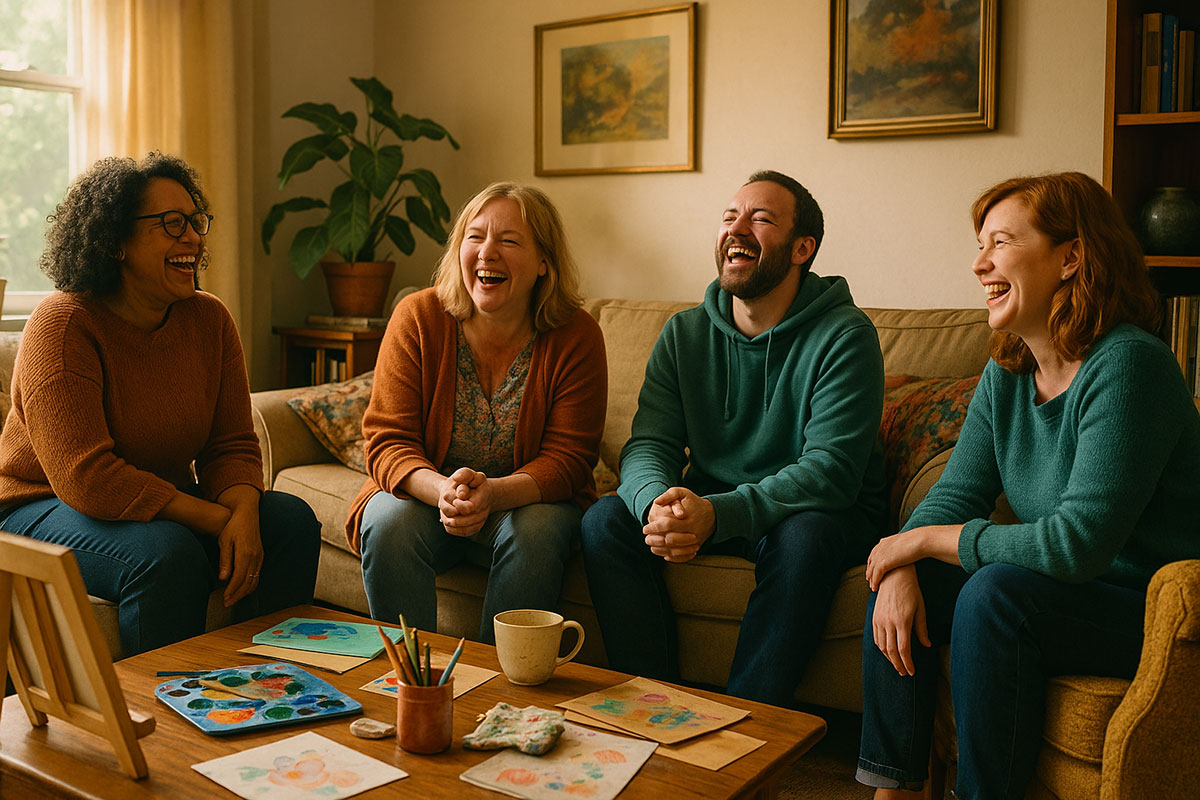
|
Getting your Trinity Audio player ready...
|

Loretta LaRoche
Oh, honey, let me tell you — life is too short to be walking around like you’ve been sucking on a lemon since 1974. We’re all running around like “human doings” instead of “human beings,” checking things off lists that no one will ever read. And for what? So our gravestones can say, She Had Great Laundry Skills? Please.
Here’s the thing: joy doesn’t happen when all your ducks are in a row. It happens when you stop chasing the ducks, sit down, and feed them some bread. Over the next five conversations, I’ve invited some wonderful, funny, and slightly unhinged people — my favorite kind — to join me in exploring how to grow older without growing dull, how to worry less without becoming a complete idiot, why perfection is the worst party guest, how to feed your soul as well as your body, and why fun is not a waste of time, but a requirement for survival.
I want you to imagine we’re all sitting around my kitchen table. There’s a teapot that hasn’t matched its lid since the Reagan administration, mismatched chairs, and probably a cat who doesn’t belong to me wandering in. We’re going to tell stories, laugh until mascara runs, and maybe learn something along the way. So take off the Spanx, loosen the belt, and let’s get started.
(Note: This is an imaginary conversation, a creative exploration of an idea, and not a real speech or event.)
Topic 1: The Art of Aging Playfully — Why Growing Older Shouldn’t Mean Growing Dull

Moderator:
Betty White (in spirit) – Comedy legend and lifelong advocate for humor, charm, and joy at any age.
Panelists:
Loretta LaRoche, Jane Fonda, Carl Reiner (in spirit), Iris Apfel, Norman Lear
Betty White: Well, here we are—five people who’ve been around the block enough times to need a GPS and a comfortable pair of shoes. Let’s start with the obvious: Why should getting older be something we embrace, not dread?
Loretta LaRoche: Because the alternative is… well, not being here. Every day is a bonus round. And with age comes the privilege of caring less about what people think—which is liberating and very funny if you do it right.
Jane Fonda: For me, aging has been about shedding. I’ve let go of roles that didn’t fit, expectations that weren’t mine, and habits that drained me. It’s like pruning a tree—necessary for new growth.
Carl Reiner: And there’s a lot of comedy in it! I mean, you can’t find your glasses because you’re wearing them, or you put your phone in the fridge. These are gifts from the universe to keep us entertained.
Iris Apfel: Oh, and let’s not forget—style only gets better with age. You stop dressing for approval and start dressing for joy. Sequins in the grocery store? Why not?
Norman Lear: We should embrace age because it gives us perspective. And perspective is what lets you laugh at the ridiculousness of it all, especially yourself.
Betty White: Alright, but many people feel society sidelines them after a certain age. How do we keep from becoming invisible?
Iris Apfel: You make yourself visible—literally and figuratively. I dress like a peacock on purpose. I want the world to see I’m here and having a ball.
Loretta LaRoche: Humor is a spotlight. When you tell a great story, people lean in. When you poke fun at your own quirks, you draw people toward you instead of disappearing in the background.
Norman Lear: And you keep showing up. If you stop engaging—politically, socially, creatively—you’re handing over your seat at the table.
Carl Reiner: Exactly. I kept creating into my 90s because I wasn’t done. Age doesn’t mean the curtain’s down—it just means you’ve learned how to hit your lines better.
Jane Fonda: And we have to advocate for ourselves and each other. Ageism is real, but it doesn’t stand a chance against a united, visible, and unapologetically vibrant community.
Betty White: Now let’s talk about joy. What’s one thing you do that keeps life playful?
Carl Reiner: I told jokes every day, even if it was just to myself. Sometimes I was my best audience.
Loretta LaRoche: I keep a “ridiculous rituals” list. One of them is dancing in my kitchen to ‘70s disco while wearing oven mitts. Highly recommend.
Norman Lear: I start my mornings with gratitude—and a little mischief. I’ll call someone just to say something absurd like, “Do you think penguins have knees?”
Jane Fonda: I learn something new—doesn’t matter if I’m good at it. Curiosity keeps you young. Right now, I’m learning the ukulele. Badly.
Iris Apfel: I play dress-up every day. Life is too short for beige.
Betty White: (laughs) If I could add one—it’s flirting. Works at any age. Keeps the heart rate up.
Betty White: Some people think aging means giving things up. What’s one thing you refuse to give up?
Iris Apfel: My sense of adventure. I’ll try anything once—twice if it’s fabulous.
Carl Reiner: My work. Creativity keeps me breathing.
Loretta LaRoche: Laughing at inappropriate times. If you lose that, you’ve lost the plot.
Norman Lear: My optimism. I’ve lived through wars, depressions, and political upheavals—hope is non-negotiable.
Jane Fonda: My voice. Whether it’s for activism or just speaking truth in a room, I won’t go quietly.
Betty White: Alright, let’s wrap with this: Finish the sentence—“The secret to aging playfully is…”
Carl Reiner: …staying curious and telling stories until they make someone snort.
Loretta LaRoche: …seeing the absurdity in life and choosing to laugh instead of complain.
Norman Lear: …keeping your mind open and your heart younger than your knees.
Jane Fonda: …investing in your passions, no matter your age.
Iris Apfel: …wearing what makes you feel like the main event—sequins optional, attitude mandatory.
Betty White: …remembering that every extra candle on the cake means more light to see the beauty around you.
Betty White: Well, folks, if this conversation doesn’t make you want to live out loud, I don’t know what will. Remember: Life is too short—and sometimes too long—to live without a sense of humor and a splash of sparkle.
Topic 2: Worry Less, Live More — Escaping the Anxiety Hamster Wheel

Moderator:
Brené Brown – Research professor, bestselling author, and expert on vulnerability, courage, and emotional resilience.
Panelists:
Loretta LaRoche, Mel Robbins, Maria Bamford, Deepak Chopra, Hasan Minhaj
Brené Brown: We’re here to talk about worry—the great thief of joy. I want to start with this: Why do so many of us cling to worry like it’s a security blanket, when it’s actually strangling us?
Loretta LaRoche: Because we think worry means we care. It’s like a superstition—if I imagine every disaster, maybe I’ll prevent it. But all it does is drain your joy before anything even happens.
Mel Robbins: Absolutely. Worry feels like you’re doing something, but it’s a mental hamster wheel—lots of motion, no progress. The only way to stop is to interrupt it with action.
Maria Bamford: I also think worry can be addictive. My brain loves a good spiral—like, “What if I run out of toothpaste?” and suddenly I’m living in a cave without dental care.
Deepak Chopra: Worry is a symptom of identification with the mind. You are not your thoughts. When you realize this, you can step outside the cycle and choose peace.
Hasan Minhaj: And sometimes, worry is just inherited. If you grew up in a house where panic was the family soundtrack, you think it’s normal.
Brené Brown: So, if worry is learned, how do we start unlearning it?
Mel Robbins: My trick is the 5-Second Rule—count down 5-4-3-2-1 and then do something physical to break the pattern. Call a friend, take a walk, start the task you’re avoiding.
Loretta LaRoche: I like to exaggerate my worry until it becomes absurd. “What if I don’t finish this project? Oh, then I’ll be living in a cardboard box with a raccoon roommate named Stanley.” At that point, I’m laughing too hard to keep worrying.
Maria Bamford: Yes! I give my anxiety a ridiculous voice. Suddenly my inner critic sounds like a chipmunk who’s late for a meeting, and it’s hard to take it seriously.
Deepak Chopra: Meditation is a powerful unlearning tool. Even a few minutes of mindful breathing can remind you that the present moment is always safe.
Hasan Minhaj: I replace worry with curiosity. Instead of “What if this goes wrong?” I ask, “What if this works out?” That shift changes everything.
Brené Brown: A lot of people think worry equals responsibility. How do you stay engaged without falling into constant anxiety?
Deepak Chopra: Responsibility doesn’t require fear. You can act from a place of clarity instead of panic. In fact, calm decisions are usually more effective.
Mel Robbins: Set limits. You can’t solve every problem in the world, so pick what’s actually in your control and let the rest go.
Hasan Minhaj: Humor helps here too. If you can find the comedy in your “serious” situation, it loses its power over you.
Maria Bamford: And if you can’t find the humor, watch someone else’s comedy until your brain remembers what laughter feels like.
Loretta LaRoche: Remember, you are not on call for the entire planet. Give yourself permission to turn off the “worry hotline” in your head.
Brené Brown: Let’s get personal. What’s one thing you’ve stopped worrying about that’s made your life better?
Loretta LaRoche: What other people think of me. I realized they’re too busy worrying about themselves to notice my mismatched socks.
Maria Bamford: I stopped worrying about being “normal.” Turns out, normal is just a setting on the dryer.
Deepak Chopra: I stopped worrying about the future. The future is only a projection of the mind—it doesn’t actually exist yet.
Hasan Minhaj: I stopped worrying about having all the answers before starting something. You figure it out along the way.
Mel Robbins: I stopped worrying about being perfect. It’s better to be done than perfect—and perfect never arrives.
Brené Brown: Before we wrap, finish this sentence: “If I worried less, I would…”
Loretta LaRoche: …dance more in my kitchen and spend less time catastrophizing over burnt toast.
Mel Robbins: …launch more ideas without second-guessing myself to death.
Maria Bamford: …have way more energy to enjoy the weird little things in life.
Deepak Chopra: …experience deeper peace and connection with the present.
Hasan Minhaj: …take bigger risks and have better stories to tell my kids.
Brené Brown: …and I’d have more room for joy, courage, and belonging. Which, I think, is the whole point.
Brené Brown: Friends, the hamster wheel isn’t your home—it’s just where you’ve been running. Step off, breathe, laugh, and remember that life’s not meant to be rehearsed in fear. It’s meant to be lived—messily, joyfully, and with a little curiosity about what might actually go right.
Topic 3: Perfection Is Overrated — How to Love Life Without the Polished Finish

Moderator:
Tina Fey – Comedian, writer, and actress, known for her smart, self-deprecating humor and fearless take on imperfection.
Panelists:
Loretta LaRoche, RuPaul, Anne Lamott, Seth Meyers, Elizabeth Gilbert
Tina Fey: Alright folks, let’s start with a truth bomb—perfection is boring. If your life looks like a glossy magazine spread, you’re either hiding something or you have way too much free time. So, why are we all still chasing it?
Loretta LaRoche: Because somewhere along the way, we decided life was a competition for “Most Perfect Human.” I say forget that—embrace your smudges, your mismatched socks, and the fact that your car looks like a rolling thrift store.
RuPaul: Perfection is a drag—literally. The most fabulous looks I’ve ever done had something slightly off, because that’s where the personality lives.
Anne Lamott: Perfectionism is the voice of the oppressor. It’s fear in a shiny outfit. I’d rather have an authentic mess than a polished lie.
Seth Meyers: And chasing perfection kills comedy. Nobody laughs at “flawless.” People laugh when the cake falls over.
Elizabeth Gilbert: Perfection is also a creativity killer. You don’t finish anything if you’re waiting for it to be perfect—you just sit there polishing your own fear.
Tina Fey: Okay, so how do you personally resist the perfection trap?
Loretta LaRoche: I actively collect small disasters. I burn the toast, wear two different shoes, and treat them like trophies. It reminds me that I’m still alive and laughing.
RuPaul: I focus on what brings me joy, not what wins approval. That shift changes everything.
Anne Lamott: I practice radical honesty. If I’m feeling messy, I let people see it. I let my hair do what it wants. I let the laundry pile up.
Seth Meyers: I write jokes about my own screw-ups before anyone else can. Beat the critics to the punch.
Elizabeth Gilbert: I finish things even when I think they’re imperfect. Done is better than perfect—it’s also better than never started.
Tina Fey: Social media has made perfectionism even worse. Everyone’s life looks like a highlight reel. How do we fight that pressure?
Anne Lamott: Stop scrolling. Or at least stop comparing. People are only showing you their best five minutes, not their messy Tuesday mornings.
Loretta LaRoche: Post the bloopers. Let people see your burnt dinner or your crooked Christmas tree.
RuPaul: Remember that social media is drag—it’s a performance. Don’t mistake it for the whole truth.
Seth Meyers: I post pictures of my dog mid-blink. Keeps expectations low.
Elizabeth Gilbert: Curate your feed with imperfection in mind—follow people who make you laugh, not people who make you feel less than.
Tina Fey: What’s one thing you’ve let go of trying to perfect?
Loretta LaRoche: My house. I’d rather have laughter and crumbs than silence and spotless counters.
RuPaul: My body image. I love dressing it up, but I’m done pretending it needs to look like anyone else’s.
Anne Lamott: My writing process. I used to wait for the “perfect” sentence. Now I just get it on the page and fix it later.
Seth Meyers: My parenting. I’m aiming for “loving and imperfect,” not “flawless and exhausted.”
Elizabeth Gilbert: My relationships. They don’t have to look like a movie—they just have to be real.
Tina Fey: Let’s wrap with this: Finish the sentence—“Life gets better when you…”
Loretta LaRoche: …stop ironing your soul to fit someone else’s mold.
RuPaul: …let yourself be fabulous without needing to be flawless.
Anne Lamott: …accept that you’re a mess and love yourself anyway.
Seth Meyers: …find the humor in the broken parts.
Elizabeth Gilbert: …finish the thing, even if it’s not perfect, and share it anyway.
Tina Fey: …realize that imperfection is the best special effect life has to offer.
Tina Fey: Friends, perfection isn’t the prize—it’s the trap. The gold is in the crooked, the wobbly, the slightly-too-much. So, here’s your homework: Burn something, mismatch something, post something ridiculous, and watch how much lighter you feel.
Topic 4: The Joy Diet — Feeding Your Life With More Than Just Food

Moderator:
Jamie Oliver – Chef, restaurateur, and advocate for joyful, accessible eating and healthy communities.
Panelists:
Loretta LaRoche, Nigella Lawson, Samin Nosrat, Trevor Noah, Art Smith
Jamie Oliver: We all know food can feed the body, but joy? That’s a whole different menu. Let’s start here—what does a “joy diet” mean to you?
Loretta LaRoche: It’s about feeding your soul the same way you feed your stomach—regularly, with things you love, not just things you “should” have. And sometimes that’s salad, sometimes it’s cake, and sometimes it’s laughing so hard you snort.
Nigella Lawson: A joy diet is indulgence without apology. It’s savoring—whether that’s butter on bread or a conversation that stretches late into the night.
Samin Nosrat: For me, it’s variety. Just like cooking needs salt, fat, acid, and heat, life needs curiosity, kindness, beauty, and fun.
Trevor Noah: I think of it as choosing what fills you up emotionally, not just what fills you up physically. For me, that’s travel, comedy, and time with people who challenge me.
Art Smith: A joy diet is comfort food for the soul—moments and meals that remind you of where you’ve been and who you love.
Jamie Oliver: So, how do we know when our joy diet is… malnourished?
Loretta LaRoche: If you can’t remember the last time you laughed until you cried, you’re running low.
Nigella Lawson: When every meal feels rushed, every conversation is multitasked, and you can’t taste what you’re eating—or living.
Samin Nosrat: If your life feels beige. Food without seasoning is sad; so is a life without moments of surprise or delight.
Trevor Noah: When you find yourself saying “someday” more than “today.”
Art Smith: If your “treats” are only on special occasions, you’re starving your joy.
Jamie Oliver: What are some non-food ingredients you add to your daily joy menu?
Trevor Noah: Humor—every day, no matter what. It’s the universal spice.
Loretta LaRoche: Connection. I make time for at least one meaningful conversation daily. Even a five-minute chat with my mail carrier counts.
Nigella Lawson: Beauty—flowers on the table, candlelight at dinner, even if I’m eating alone.
Samin Nosrat: Curiosity—trying something new, whether it’s a recipe or a skill.
Art Smith: Service—feeding people, literally and metaphorically. Joy grows when you give it away.
Jamie Oliver: Some people think joy is a luxury, not a necessity. How do we push back on that?
Loretta LaRoche: Joy is fuel. Without it, you burn out. It’s not dessert—it’s the main course.
Nigella Lawson: And joy is contagious. When you live joyfully, you feed others too.
Samin Nosrat: People forget that joy is an energy source for resilience. You can face more challenges if your joy pantry is stocked.
Trevor Noah: In tough times, joy isn’t frivolous—it’s essential for survival.
Art Smith: Amen. Joy keeps the heart open when the world tries to close it.
Jamie Oliver: Let’s do this—if you had to plan tomorrow’s “joy menu,” what would be on it?
Loretta LaRoche: Breakfast: coffee and conversation. Lunch: a walk with a friend. Dinner: pasta, wine, and music in the kitchen. Dessert: dancing badly in my pajamas.
Nigella Lawson: Breakfast: hot buttered toast. Lunch: oysters and champagne. Dinner: roast chicken with friends. Dessert: laughter so loud the neighbors complain.
Samin Nosrat: Breakfast: a new pastry. Lunch: cooking with someone I love. Dinner: trying a recipe I’ve never made. Dessert: stargazing.
Trevor Noah: Breakfast: comedy videos. Lunch: playing soccer. Dinner: home-cooked meal with family. Dessert: swapping stories until midnight.
Art Smith: Breakfast: biscuits with honey. Lunch: cooking for my partner. Dinner: a community potluck. Dessert: hugs all around.
Jamie Oliver: Final bite—finish this sentence: “Life tastes better when…”
Loretta LaRoche: …you season it with laughter.
Nigella Lawson: …you savor every bite, every moment.
Samin Nosrat: …you share it with others.
Trevor Noah: …you stop eating on autopilot.
Art Smith: …you cook with love.
Jamie Oliver: …you remember joy is the most important ingredient you’ll ever add.
Jamie Oliver: Friends, if you only take one thing from this, it’s that joy is not optional—it’s the secret sauce. So, go home, cook something you love, share it with someone, and sprinkle a little extra joy on top.
Topic 5: “Why Fun Is a Serious Business — The Science and Soul of Play

Moderator:
Amy Poehler – Comedian, actress, and improviser, known for her upbeat humor and advocacy for saying “yes” to life.
Panelists:
Loretta LaRoche, Jimmy Fallon, Kristen Bell, Sir Ken Robinson (in spirit), Shawn Achor
Amy Poehler: You know, people talk about “having fun” like it’s something optional, like extra sprinkles on a cupcake. But here’s the truth—fun is fuel. Let’s start with this: Why is fun so essential for a happy, healthy life?
Loretta LaRoche: Because without fun, you’re basically a walking to-do list. Fun is what gives you perspective—it’s the reset button that keeps you from screaming in the frozen food aisle.
Jimmy Fallon: Fun breaks the tension. You can be in a boring meeting, but if someone cracks a joke or starts a game, suddenly everyone’s alive again.
Kristen Bell: And fun keeps you connected to people. If you can laugh with someone, you’re more likely to trust them and work well together.
Sir Ken Robinson: Play is how humans learn, innovate, and adapt. It’s not just recreation—it’s a central part of our creative evolution.
Shawn Achor: Science backs this up—positive emotions like joy and play literally rewire the brain for better problem-solving and resilience.
Amy Poehler: So why do adults stop playing? When did we all decide we were “too busy” for fun?
Loretta LaRoche: Around the same time we started scheduling “quality time” like it’s a dentist appointment. We traded spontaneity for productivity.
Jimmy Fallon: School trains it out of us. We get told to sit still, stop goofing off, and focus on “serious” things.
Kristen Bell: Social media doesn’t help—people curate their lives instead of living them. Real fun is messy and unfiltered.
Sir Ken Robinson: Our education and work systems value output over curiosity. Play is seen as a distraction, not a driver of success.
Shawn Achor: The irony is, workplaces that encourage fun see higher engagement, lower turnover, and better outcomes.
Amy Poehler: Okay, let’s get practical. What’s one thing you do to inject fun into your day?
Loretta LaRoche: I keep a prop box—hats, feather boas, fake mustaches. If you can’t make a phone call in a top hat, you’re missing out.
Jimmy Fallon: I’ll randomly start singing or beatboxing. It gets people smiling immediately.
Kristen Bell: I turn chores into games. Laundry folding competition? I win every time.
Sir Ken Robinson: I play with ideas—challenge myself to think of ten ridiculous solutions to a problem before I get serious.
Shawn Achor: I create “micro-adventures”—five-minute playful challenges with family or coworkers.
Amy Poehler: Some people think fun is frivolous, especially when times are tough. How do you respond?
Loretta LaRoche: Fun is survival. It’s the thing that keeps us going when everything else feels heavy.
Jimmy Fallon: Without fun, burnout is inevitable. It’s like running a car with no oil—you won’t get far.
Kristen Bell: Fun doesn’t mean ignoring problems—it’s what gives you the energy to face them.
Sir Ken Robinson: In difficult times, play sparks creativity, which is essential for finding new solutions.
Shawn Achor: Fun fuels optimism, and optimism fuels action.
Amy Poehler: Let’s dream big. If tomorrow were your perfect “fun day,” what would be on the schedule?
Loretta LaRoche: Morning: coffee with friends. Afternoon: improv games. Evening: dancing badly with a room full of people doing the same.
Jimmy Fallon: Morning: musical jam session. Afternoon: silly game show. Evening: lip-sync battle with friends.
Kristen Bell: Morning: hiking with my family. Afternoon: board games. Evening: singing Disney songs way too loudly.
Sir Ken Robinson: Morning: brainstorming creative ideas with students. Afternoon: painting. Evening: storytelling with friends.
Shawn Achor: Morning: outdoor games. Afternoon: a surprise adventure. Evening: dinner with laughter as the main course.
Amy Poehler: Final round—finish this sentence: “Life gets better when you…”
Loretta LaRoche: …stop waiting for permission to play.
Jimmy Fallon: …say yes to ridiculous ideas.
Kristen Bell: …make joy part of your routine, not an afterthought.
Sir Ken Robinson: …value play as much as productivity.
Shawn Achor: …realize fun is a strategy for success, not a distraction from it.
Amy Poehler: …treat fun like oxygen—non-negotiable.
Amy Poehler: So here’s the takeaway: Fun is serious business because without it, we forget why we’re working so hard in the first place. Whether it’s a top hat, a game, or a random dance break, make room for play. Your brain, your heart, and your relationships will thank you.
Final Thoughts By Loretta LaRoche
Well, wasn’t that something? We’ve learned that aging playfully isn’t about Botox and green juice — it’s about keeping your sense of humor when your knees sound like castanets. Worrying less doesn’t mean you’ve suddenly become enlightened; it just means you’ve realized most of the things you fret about never even RSVP to your disaster party. And perfection? Oh, darling, if you’re still chasing that, you’re missing all the good messy stuff that makes life worth living.
We’ve also figured out that the “Joy Diet” isn’t about kale, although if you like it, good for you. It’s about making sure your soul’s getting fed with music, friends, belly laughs, and the occasional nap. And fun? Fun is not negotiable. If you think you’re too busy for it, you’re exactly the person who needs it the most.
So my wish for you is this: Don’t wait for the perfect moment to laugh. Laugh when you burn the toast, when the dog steals your sandwich, when you forget why you walked into the room. Life is going to throw curveballs; you might as well dance while you’re dodging them. And remember — you’re not here to impress the world. You’re here to enjoy the ride.
Short Bios:
Loretta LaRoche – Stress management expert, humorist, and author blending psychology, wit, and everyday wisdom to help people laugh at life’s challenges.
Brené Brown – Research professor, storyteller, and bestselling author whose work on courage, vulnerability, and empathy inspires millions to live wholeheartedly.
George Burns – Legendary comedian and actor whose career spanned nearly a century, famous for his sharp wit and timeless charm.
Phyllis Diller – Groundbreaking comedian known for her eccentric persona, rapid-fire jokes, and trailblazing role for women in stand-up.
Betty White – Iconic actress, comedian, and TV pioneer celebrated for her warmth, humor, and enduring popularity.
Steve Harvey – Comedian, television host, and author known for his quick humor, motivational style, and relatable life advice.
Billy Crystal – Actor, comedian, and writer celebrated for blending humor with heartfelt storytelling.
Jane Fonda – Award-winning actress, fitness advocate, and activist known for her vibrant energy and reinvention at every stage of life.
Jerry Seinfeld – Stand-up comedian and actor renowned for observational humor about everyday life.
Ellen DeGeneres – Comedian and host recognized for her playful humor, kindness message, and connection with audiences.
Dolly Parton – Legendary singer-songwriter and philanthropist whose warmth, wit, and positivity inspire across generations.
Jimmy Fallon – Comedian and late-night host celebrated for his upbeat personality, musical sketches, and approachable humor.
Kristen Wiig – Actress and comedian acclaimed for her versatility, offbeat humor, and memorable characters.
Jim Gaffigan – Stand-up comedian known for clean, observational humor about family life and everyday absurdities.
Whoopi Goldberg – EGOT-winning actress and comedian with a fearless comedic voice and cultural insight.
Bill Murray – Actor and comedian known for his dry wit, improvisational style, and ability to find humor in the unexpected.
Trevor Noah – Comedian and former “Daily Show” host recognized for sharp social commentary and global perspective on humor.
Lily Tomlin – Actress and comedian celebrated for her character work and blending humor with empathy.
Carol Burnett – Legendary actress and sketch comedian whose variety show defined comedic excellence for decades.
Ricky Gervais – Comedian, writer, and actor known for his biting wit, bold humor, and insightful takes on human nature.

Leave a Reply